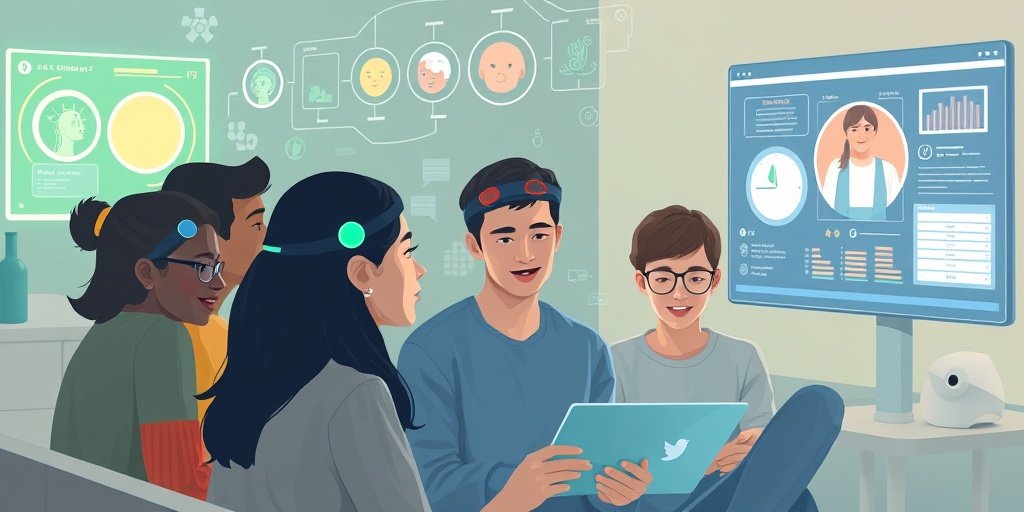⚡ Quick Summary
This article discusses the urgent need for personalized prevention strategies in youth mental health, particularly during the vulnerable adolescent period. It highlights the potential of AI-driven interventions to enhance early detection and support, aiming to bridge the mental healthcare gap.
🔍 Key Details
- 📊 Focus: Youth mental health prevention strategies
- 🧩 Key Period: Adolescence, a critical time for mental health issues
- ⚙️ Technology: AI in emotion recognition and mHealth interventions
- 🌍 Collaboration: Multidisciplinary approach involving psychology, computer science, and more
🔑 Key Takeaways
- 🧠 Mental illnesses significantly impact individuals and communities.
- 📉 Adolescents face increasing mental health challenges due to declining healthy behaviors.
- 🤖 AI advancements in emotion recognition show promise for early intervention.
- 💡 Effective prevention requires holistic, individualized approaches.
- 📱 mHealth interventions can leverage digital biomarkers for monitoring.
- 💰 Cost-effectiveness evaluation is crucial for sustainable implementation.
- 👥 Participatory research ensures user acceptance of new strategies.
- 🔗 Integration into regular healthcare systems is essential for success.

📚 Background
The impact of mental illnesses extends beyond individual suffering, affecting families and communities. Adolescence is a particularly vulnerable period, marked by a rise in mental health issues exacerbated by societal inequalities and declining healthy behaviors. This highlights the need for effective prevention efforts to promote well-being and resilience among youth.
🗒️ Study
This vision paper presents a multidisciplinary perspective on personalized prevention in youth mental health. It emphasizes the importance of integrating expertise from various fields, including clinical psychology, computer science, and digital innovation, to develop and implement effective prevention strategies tailored to adolescents.
📈 Results
The authors propose several key ingredients for effective preventive measures, including AI-based mHealth interventions that utilize smart and passive data from digital biomarkers. These strategies aim to provide timely support and monitor mental health effectively, addressing the urgent need for preventive care in this demographic.
🌍 Impact and Implications
The integration of AI-driven interventions in youth mental health could significantly enhance early detection and support, ultimately improving the well-being of future generations. By addressing the mental healthcare gap, these innovative approaches can foster resilience and promote healthier behaviors among adolescents.
🔮 Conclusion
This article underscores the critical need for personalized prevention strategies in youth mental health. By leveraging advancements in AI and fostering multidisciplinary collaboration, we can develop effective interventions that meet the unique needs of adolescents. The future of mental healthcare looks promising, and continued research in this area is essential for enhancing youth well-being.
💬 Your comments
What are your thoughts on the integration of AI in youth mental health prevention? We would love to hear your insights! 💬 Leave your comments below or connect with us on social media:
Multidisciplinary perspectives on personalised prevention in youth mental health.
Abstract
The pervasive impact of mental illnesses extends beyond individual suffering, affecting families, communities, and societies at large. Prevention efforts are imperative to mitigate this burden, promoting well-being and resilience across diverse populations. A particularly vulnerable period is adolescence, which is associated with numerous mental health issues that are exacerbated by declining healthy behaviours as well as socioeconomic inequalities. But adolescence also presents an opportune moment for early intervention. However, recognising warning signs and providing timely support involves considerable hurdles, so innovative prevention measures are needed. Advancements in AI, particularly in emotion recognition, offer promise for early mental health intervention. Yet, current AI achievements fall short in addressing the mental healthcare gap. This vision paper seeks to outline future directions and recommendations for effective preventive approaches by integrating experts of the necessary multidisciplinary field to develop, evaluate and implement novel and promising prevention approaches. Therefore, representatives based in Europe from diverse fields such as clinical psychology, computer science, physical activity, nutrition, economics, entrepreneurship, politics, and digital innovation propose potential avenues to integrate efficient treatment, AI methodology, and comprehensive implementation strategies that align with user needs. Based on a literature review and expert consensus, key ingredients suggested for effective preventive measures for mental health include holistic, individualised, AI-based mHealth interventions, leveraging smart and passive data from digital biomarkers for monitoring and feedback, evaluating cost-effectiveness, conducting participatory research to ensure user acceptance, and identifying barriers and facilitators for integration into regular healthcare systems. By utilising AI-driven interventions for adolescents, we can address the urgent need for preventive mental healthcare, ultimately enhancing the well-being of future generations.
Author: [‘Löchner J’, ‘Bolivar M’, ‘Booth L’, ‘Canella S’, ‘Calobro M’, ‘Firth J’, ‘Garcia-Palacios A’, ‘Kyritsaka A’, ‘Sander LB’, ‘Seiferth C’, ‘Seizer L’, ‘Teesson M’, ‘Tyrowicz J’, ‘Vogel L’, ‘Wheeler E’, ‘Wolstein J’, ‘Schuller BW’]
Journal: Front Digit Health
Citation: Löchner J, et al. Multidisciplinary perspectives on personalised prevention in youth mental health. Multidisciplinary perspectives on personalised prevention in youth mental health. 2025; 7:1568472. doi: 10.3389/fdgth.2025.1568472